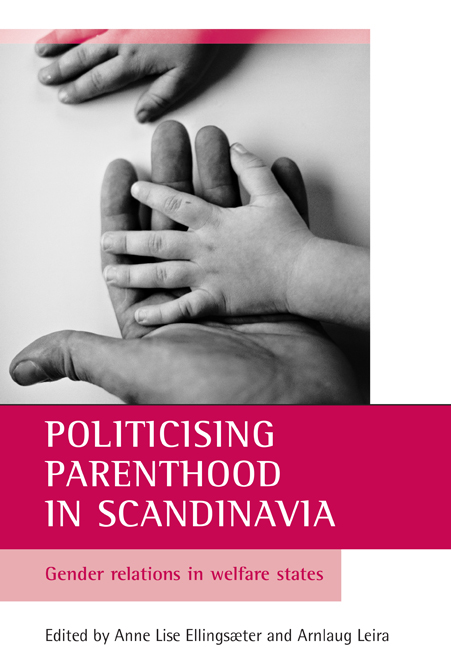Book contents
- Frontmatter
- Contents
- List of boxes, figures and tables
- Acknowledgements
- List of contributors
- one Introduction: politicising parenthood in Scandinavia
- Part One Politicising parenthood – legacies and challenges
- Part Two Gender equality and parental choice in welfare state redesign
- Part Three Work, family and the welfare state: redefining family models
- Index
six - The Norwegian childcare regime and its paradoxes
Published online by Cambridge University Press: 15 January 2022
- Frontmatter
- Contents
- List of boxes, figures and tables
- Acknowledgements
- List of contributors
- one Introduction: politicising parenthood in Scandinavia
- Part One Politicising parenthood – legacies and challenges
- Part Two Gender equality and parental choice in welfare state redesign
- Part Three Work, family and the welfare state: redefining family models
- Index
Summary
Childcare matters are increasingly central to contemporary welfare state debate and policy reform. The organisation of childcare affects the gender relations of parenthood, and boundaries between work and parental care are one of the most contested issues. Three family policy models with assumedly different implications for childcare and gender equality are commonly distinguished: states supporting the dual-earner family, states supporting a traditional male breadwinner family, and states leaving it to individuals to find private or market-based solutions (Korpi, 2000). Scandinavian policies are usually associated with the dual-earner family model, or at least as moving in that direction. National policy models are often more complex than this typology suggests, however, as they combine different policy elements. Besides, policy models change over time, and recent policy developments display increasing complexity and diversity that may blur conventional typologies (for example, Daly, 2000; Daly and Lewis, 2000; Mahon, 2002a; Michel and Mahon, 2002).
Historically, Norway has actually been acknowledged as a family policy ‘hybrid’, combining dual-earner support with traditional breadwinner elements, including generous cash transfers to families (Ellingsæter, 2003). This family policy dualism (Ellingsæter, 2003, p 421) has been noted as the Norwegian ‘ambivalence’ or ‘double-track’ (Leira, 1992; Skrede, 1999). Some scholars perceive it as part of a more general divergence from the Scandinavian model of gender and welfare – the Norwegian ‘puzzle’ (Sainsbury, 2001). Gender traditionalism and ambivalence towards employed mothers have been characteristic. It is possible to argue that the policy ‘hybrid’ is reproduced in recent policy reforms. Yet, the very meaning of policy dualism may change over time, as the contexts of policies do change. Hence, the analysis of the politics of childcare needs to be ‘placed in time’ (Pierson, 2004).
Placing the Norwegian childcare regime in the present time, the mid-2000s, examining the regime's boundaries between work and parental care and the implications for the gender relations of parenthood, is the ambition of this chapter. Regulations on parents’ right to work versus childcare in the early stages of parenthood – the central contemporary battlefield for these issues – are the focus of attention. A multi-causal, contextual approach is needed in the study of parenthood policies (Ellingsæter, 2003). National case studies are particularly valuable, as they attend to complexity, context and chronology within the national setting (Daly and Lewis, 1998). In exposing the dynamics of actors, ideas and practices shaping policy content and outcomes, case studies are indispensable.
- Type
- Chapter
- Information
- Politicising Parenthood in ScandinaviaGender Relations in Welfare States, pp. 121 - 144Publisher: Bristol University PressPrint publication year: 2006
- 5
- Cited by

